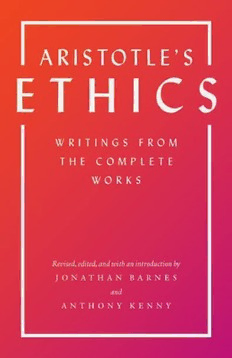
Aristotle's ethics: writings from the complete works PDF
Preview Aristotle's ethics: writings from the complete works
A R I S T O T L E ’ S E T H I C S A R I S T O T L E ’ S E T H I C S W R I T I N G S F R O M T H E C O M P L E T E W O R K S Revised, edited, and with an introduction by J O N A T H A N B A R N E S and A N T H O N Y K E N N Y Princeton University Press Princeton and Oxford Copyright © 2014 by The Jowett Copyright Trustees Requests for permission to reproduce material from this work should be sent to Permissions, Princeton University Press. Published by Princeton University Press, 41 William Street, Princeton, New Jersey 08540 In the United Kingdom: Princeton University Press, 6 Oxford Street, Woodstock, Oxfordshire OX20 1TW press.princeton.edu Jacket design by Jason Alejandro All Rights Reserved Library of Congress Cataloging-in-Publication Data Aristotle. [Works. Selections. English. 2014] Aristotle’s ethics : the complete writings / edited by Jonathan Barnes and Anthony Kenny. pages cm Includes indexes. ISBN 978-0-691-15846-4 (pbk. : alk. paper) 1. Ethics—Early works to 1800. I. Barnes, Jonathan, 1942–editor of compilation. II. Kenny, Anthony, 1931–editor of compilation. III. Title. B407.B37 2014 171′.3—dc23 2013030226 British Library Cataloging- in- Publication Data is available This book has been composed in MVB Verdigris Pro, Lydian MT, and Syntax LT Std. Printed on acid- free paper. Printed in the United States of America 1 3 5 7 9 10 8 6 4 2 C O N T E N T S INTRODUCTION 1 EUDEMIAN ETHICS 23 NICOMACHEAN ETHICS 207 MAGNA MORALIA 373 VIRTUES AND VICES 475 GLOSSARIES 485 INDEX OF NAMES 495 GENERAL INDEX 499 A R I S T O T L E ’ S E T H I C S I N T R O D U C T I O N Aristotle was born in 384 in the small township of Stagira, in north- eastern Greece. His father, Nicomachus, was a physician attached to the Macedonian court. At the age of seventeen he moved south to Athens, and joined the Academy, that brilliant band of philosophers, scientists, mathematicians, and politicians which gathered in Athens under Plato’s leadership. For twenty years he remained as Plato’s pupil and colleague, and made a name for himself as an industrious student, a vigorous polemicist, and an inde- pendent thinker, with an early interest in rhetoric, logic, metaphysics, and ethics. In 359 King Philip II succeeded to the throne of Mace- don. He adopted an expansionist policy, waged war on a number of Greek city-s tates, and made himself master of Greece. It cannot have been an easy time for a Macedonian in Athens, though Aristotle remained on the warmest terms with Plato, whom on his death in 347 he described as the best and happiest of mortals ‘whom it is not right for evil men even to praise’. Once Plato was dead, however, Aristotle found it prudent to emigrate. He settled in the eastern Aegean, first at Atar- neus, then at Assos. Hermias, the ruler of Atarneus, was a graduate of the Academy, and offered an intellectual home to Aristotle and a few fellow- exiles. Aristotle later married his adopted daughter. During his period in Assos, and during the next few years when he lived at Mytilene on the island of Lesbos, Ar- istotle carried out extensive scientific research, particularly in zoology and marine biology, whose results remained un- rivalled for two millennia. Here Aristotle first worked with Theophrastus, who was to become his successor and great- est pupil.
